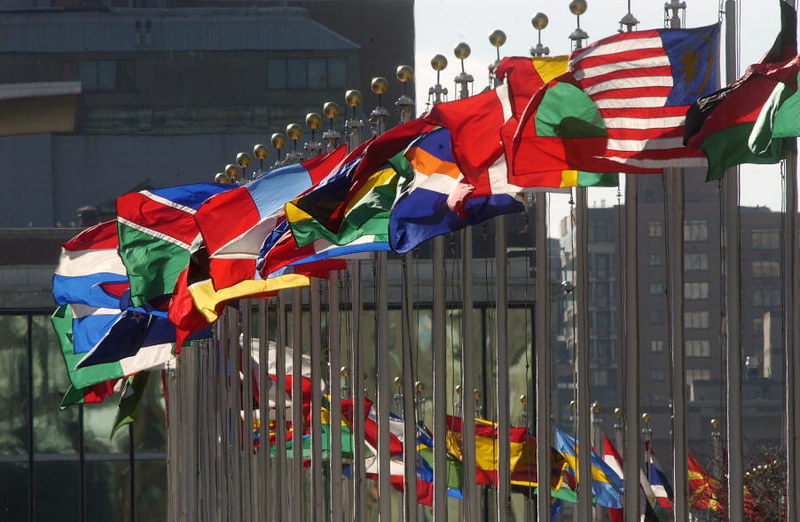Findings from Government Studies
Flags of member nations flying at United Nations Headquarters. 30/Dec/2005.
For the last three months, I’ve been researching and comparing governments. I have done this through compiling different comparative indexes, most prominently the World Bank Government Indicators and Legatum Prosperity Index, and doing research to fill in the cracks.
In the beginning, I wanted to find out if Canada’s government, compared to the U.S., is as dreamy as some say. Is the grass really greener on the other side? I learned that Canada is a parliamentary democracy: Power is held primarily in the legislature, while the United States is a presidential democracy: power is split between a legislature, an executive and a judiciary. After some research, I found that Canada’s government is considered more effective than ours by most comparative indexes. But that answer only broadened my curiosity. Questions came up like: Are parliamentary democracies more effective than presidential democracies across the world? Can government effectiveness by chosen system be truly compared in our uncontrolled environment of a world? On a broad scale, which governments are most effective? And what factors make governments successful, besides the obvious (GDP, unemployment rate, etc.?)
I set out to explore further. And while my research is not yet complete, and many of my questions cannot be answered objectively given the wide variety of interpretations, my understanding has grown significantly.
One of the first things I found in my research is that each country has a unique culture surrounding their government. Specifically, how people think about, praise and criticize it. For example, in China, the generally held belief is that you prioritize the ‘common good’ in thinking about government, before personal democratic rights. Criticizing the government in most cases is a social taboo. People generally believe that a stable and economically secure country is worth more than individual democratic rights, though they might be nice to have. The United States represents the opposite. Our country was founded on the ideas of putting personal freedom first, and sacrificing everything to keep it if necessary, for better or worse. Those ideas have not left with time. Criticizing the government is commonplace and not a social taboo, with caveats aside.
I was further struck by learning about how democracy exists on a spectrum, and that many countries outwardly identify with concepts that are not actually found in their governments. I spent hours researching what each country’s governmental system is, but then found a resource that grades democracies from 1-10, with some so-called democracies being on the authoritarian end. An obvious example is how the Democratic People’s Republic of Korea is, in fact, one of the most authoritarian countries in the world. If you look at how the Chinese government describes itself, the word ‘democracy’ is used frequently, despite the Chinese government’s authoritarianism. Madagascar is an even more extreme case of this, in which the country is by most accounts undemocratic, but just enough to call itself a democracy, and be given foreign aid so it’s people don’t starve. Even the appearance of democracy can be used as a powerful tool.
I was also surprised to learn that there are a select few governments with non-democratic structure generally hailed as more effective than the average, like the United Arab Emirates. Their government is structured in an autocracy, but is still considered effective by the indices.
I also discovered that some countries, besides our own, may be in transition. For example, India considered changing from a parliamentary democracy to a presidential democracy in 2010 for many of the same reasons that some thought leaders in the US have advocated going in the opposite direction: lack of strong leadership, government corruption, low voter turnout, distrust in institutions etc. So while a given government structure can predict outcomes, it is not always the strongest indicator of government effectiveness.
I have learned that it is difficult, if not impossible to compare different governments given the myriad conditions like culture, internal and external conflict, outside influence, natural resources, geography, climate etc. that determine their success and challenges. Yet the research is no less important. In examining different rankings of governments, I found that the more prominent sources are used as a resource for substantial investment and aid in the world, and are the basis for many international relationships. Now that I have created my index of indices for over 160 countries, I look forward to sharing more take-aways in the coming weeks.










